Ariadne Lih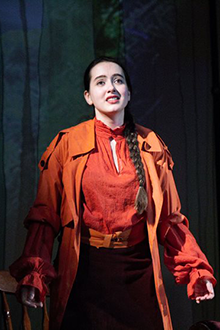
Where do you call home?
Montreal! I grew up here, and I'm planning on staying. It's my favorite city.
What would being named the winner of the Wirth Vocal Prize enable you to do?
Pay reparations to the Kanienʼkehá꞉ka people, whose land we live on, and other BIPOC communities; take care of professional necessities such as headshots and demo recordings; and devote real time and energy in the coming year to my voice and my projects.
Learn more
Who are you studying with and who will be your collaborative pianist?
Currently, I'm working with Anja Strauss, and for the first part of my degree I studied with my longtime teacher, Tracy Smith Bessette. My collaborative pianist is Nate Ben-Horin. I'm very fortunate to collaborate with and learn from such great people and musicians.
Do you have a favourite part of your program?
I love all my pieces, but my favourite is probably the Lili Boulanger. Her music is absolutely stunning, and it's great to sing poetry about women that doesn't objectify women. For me, Clairières dans le ciel (the cycle as a whole) represents a profound narrative about trauma, memory, and grieving one's former self.
What’s a recent musical discovery you’ve made?
I had never sung any Amy Beach before this year, and it's wonderful how many sides she has a composer, from expansive and hyper-Romantic to supremely delicate and charming.
This has undoubtedly been a challenging year. How has music helped you find connection?
The new Demi Lovato album really speaks to me.
When you’re not in preparation and practice mode, how do you disconnect?
I pet my cats, Calypso and Galatea.
Biography
Based in Tio'tia:ke (currently known as Montreal) on the lands of the Kanienʼkehá꞉ka people, Ariadne Lih is a soprano and queer feminist sexual assault survivor who loves cats. She sings opera, oratorio, and chamber music from the earliest notations to the present day, and co-directs The Uncommon Music Festival, where she does her best to make feminist chamber music rooted in land and community.
Currently, you can hear her online with Lucas Harris as part of the Cozzolani Reunited project and with a humpback whale as part of the Conversations with Whales project piloted by the Uncommon Music Festival.
Upcoming projects include the Early Music America Emerging Artists Showcase and the Cité des dames festival in Montreal. She has a B.A. in music from Yale University and a master’s degree in opera from the Schulich School of Music.
Avery Lafrentz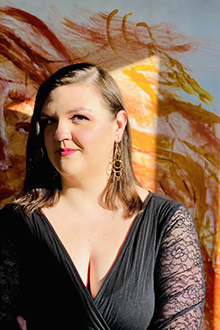
Where do you call home?
I am from Estevan, Saskatchewan and always miss the smell of the fields in summer. However, since moving to Montreal in the Summer of 2019 I feel like it became my home within a few days of arriving.
What would being named the winner of the Wirth Vocal Prize enable you to do?
It would be very worthwhile to me to bring more Art Song and Opera experiences to smaller communities across Canada. As someone from a small prairie town, it would have done wonders to be exposed to more types of singing and artistry happening in my own town. I would use the endowment from the Wirth Prize as a tool to fund the curation and rehearsal process of a new recital. I have ideas about commissioning new works to showcase on this recital, as well as making it a touring recital for the Summer of 2022 or later, depending on the world’s situation.
Learn more
Who are you studying with and who will be your collaborative pianist?
I am really enjoying studying with my current teacher, Professor Dominique Labelle. Esther Gonthier will be performing this program with me.
Do you have a favourite part of your program?
My favorite part of my program is the way the songs transition into one another. I love the journey of atmospheres in the front half of my recital. I will also be singing a song about coming home and being among those who love you after having to be apart, which is something so real in our lives right now. I hope what we will be performing can bring a healing escape to someone.
What’s a recent musical discovery you’ve made?
I recently discovered that Sergei Rachmaninoff is credited as one of the composers of Celine Dion’s hit “All By Myself”. The songwriter, Eric Carmen, didn’t realize the concerto wasn’t out of public domain when he “borrowed” from the second movement of Rachmaninoff’s Piano Concerto no. 2 op. 18. The composer’s estate flagged it and sued him, and now receives writing credit and 12% of the song’s royalties. I like that fact so much.
This has undoubtedly been a challenging year. How has music helped you find connection?
Music always keeps me motivated and busy, but this year music helps me find the silence in myself. By grounding me in my body, music allows me to stay alive in the present moment instead of surrendering to the world’s chaos. The way McGill has allowed us to keep the doors open to music-making has been the biggest blessing of this year. Creating music with colleagues and faculty was the way I did most of my socializing this year, and I am forever grateful.
When you’re not in preparation and practice mode, how do you disconnect?
I like to stay curious and be in touch with my inner kid. Right now I am figuring out how to solve a Rubik’s cube and honing my frisbee skills. I am also watching every Disney animated film ever made to keep up appearances as the “cool auntie” with my niece and nephew who are both under the age of seven.
Biography
During the 2020-2021 Opera McGill season Avery performed the roles of The Governess in Britten's Turn of The Screw and Miss Pinkerton in Menotti's radio opera The Old Maid and the Thief while finishing her Master’s degree at McGill. Last season Avery was seen as Vitellia in Mozart's Clemenza di Tito, and Anna Maurrant in Street Scene by Kurt Weill. She will be returning to McGill this fall enrolled in the Graduate Diploma in Performance to continue working with her extraordinary teacher, Dominique Labelle.
Aside from her interest in opera, Avery is passionate about Art Song, and was a Professional Fellow at the prestigious art song festival SongFest in Los Angeles in 2019. One of the highlights of this series of concerts was preparing and performing repertoire with composers Jake Heggie, John Musto and Libby Larsen.
Originally from Saskatchewan, Avery grew up smelling wild clover in the prairie expanse. In her spare time, she draws and paints, as well as dabbles on self-taught ukulele to an audience of the many house plants she has rescued and propagated with her green thumb.
Jessica Toupin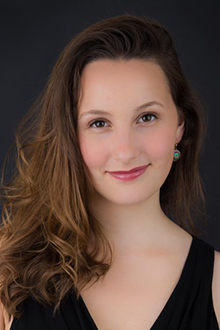
Where do you call home?
I’m born and raised in a suburb outside of Boston called Dracut, Massachusetts. Coming to Montréal for my Masters was my first time living outside of the state!
What would being named the winner of the Wirth Vocal Prize enable you to do?
To be named the winner of the Wirth Vocal Prize would be an immense honor. As an emerging young artist, the prize would allow me to continue training and traveling for auditions. Especially with the pandemic, it has been difficult to support myself financially and devote myself to the career of being an artist. The financial support would give me the opportunity to apply for and experience training opportunities that might otherwise not be financially feasible.
Learn more
Who are you studying with and who will be your collaborative pianist?
I study with the wonderful Dominique Labelle, to whom I am so grateful for. I have the great pleasure of collaborating with Kerry Agnew for this competition. Kerry and I have worked together for two years, and I think she is particularly excited to collaborate live rather than making another track! We’re looking forward to performing live together again.
Do you have a favourite part of your program?
I have many favorite moments in the program, but perhaps the most sentimental is when we perform “Oh! quante volte” from Bellini’s I Capuleti e i Montecchi. I stumbled upon classical singing in my senior year of high school, when my voice teacher introduced me to Bellini’s “Sei Ariette”. The beauty and vulnerability of these songs completed changed my path. I changed my college applications from a Math major to a dual degree in Math and Music, just so that I could keep studying and exploring this new love. Bellini’s music still has a profound effect on me and I’m happy to be able to share that experience with others, almost 7 years later.
What’s a recent musical discovery you’ve made?
“My Darling Jim” from Tom Cipullo’s Glory Denied is one of my favorite arias and I think it’s often lost on the audience the depth of the story since we only see the character, Alyce, writing a short letter in this aria. She is writing a letter to her husband, Floyd James Thompson, who was deployed to Vietnam in 1963 for a six-month tour of duty and ended up being the longest Prisoner of War, returning 10 years later in 1973. It’s a heartbreaking narrative based off of a true story, depicted in Tom Philpott’s book Glory Denied. Over the course of these nine years, Alyce works to pronounce her husband as dead instead of a Prisoner of War, since the pain is too much for her to bear. I recently read that when asked about why she denied the POW bracelet and rather hired a lawyer to pronounce him dead, she said “I wanted to be free to start over”.
This has undoubtedly been a challenging year. How has music helped you find connection?
Music has helped me find connection in the community of people and unwavering discipline required in the discipline. Despite not being able to hug or even be together physically, I feel immense support and connection to my musical community at Schulich and back home in the States.
The unwavering discipline required of us, though sometimes exhausting, has been a welcome constant in my life as so many other things seemed uncertain. Technique and score study still require us to be attentive and vulnerable, which bring me great focus and grounding.
When you’re not in preparation and practice mode, how do you disconnect?
I’ve always taught or tutored Mathematics, which I find to be a great compliment to the life of preparation and practice. I really enjoy working with kids and helping them discover new concepts and build their confidence. When I’m not working or singing, I like to be in nature. I live close Mont Royal, which has been a total saving grace this past year!
Biography
Jessica Toupin, described as “a soft, lyrical voice “ (L’Opéra Reveue québécoise d’art lyrique), made her Canadian debut as Rose Maurrant in Opera McGill’s production of Kurt Weill’s Street Scene in 2020. Previously, Jessica was a Festival Artist with Opera Saratoga covering the role of Gretel in Humperdinck’s Hänsel und Gretel and a Resident Artist with Opera North covering the role of Antonia in Tales of Hoffmann. Jessica made her international debut with the AIMS Orchestra under the baton of Lukas Beikircher in Graz, Austria in 2017.
In addition to standard repertoire, Jessica enjoys premiering new works, as she did in the fall of 2019 as the soprano soloist in the world premiere of Raphaël-Tristan Jouville’s Du cotton dans les oreilles with the McGill Contemporary Music Ensemble.
In 2021, Jessica had the distinct honor of winning the Buffalo-Toronto District of the Metropolitan Opera National Council Auditions. In this past season with Opera McGill, Jessica sang the roles of Laetitia in Menotti’s Old Maid and the Thief and Miss Jessel in Britten’s The Turn of Screw. She is graduating with her Masters degree in Opera and Voice from the Schulich School of Music under the tutelage of Dominique Labelle.
Olivier Gagnon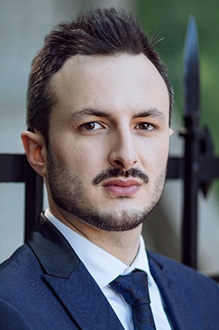
Where do you call home?
I have a geographically muddled upbringing in terms of what exactly I call home, having been born in Bermuda and then growing up in Dublin, but Montréal is my current home and I'm very happy about it, I really enjoy this city.
What would being named the winner of the Wirth Vocal Prize enable you to do?
Firstly, I imagine I'd gain some valuable name recognition for performing both opera and song repertoire, my two biggest passions. So with that, I'd explore the opportunities that might arise with people who enjoyed my work and hope to connect to more audiences in that way.
Secondly, the financial side of the prize would definitely be a game changer. Ideas I have currently include preparing and touring a full recital to show what I’m about as an artist, preparing opera roles that I could audition with in Europe and North America, making some good and polished demos of concert music I’d like to perform to connect with more conductors and organisations.
Learn more
Who are you studying with and who will be your collaborative pianist?
My voice teacher is Dominique Labelle and my principal coaches at McGill are Esther Gonthier and Stephen Hargreaves. The pianist playing with me is Jennifer Szeto.
Do you have a favourite part of your program?Oh my, okay I love my whole set but... I think I have to say I’m especially excited about performing Hugo Wolf’s fiery
Der Feuerreiter, as well as Henri Duparc’s stellar and overwhelming setting of Phidylé.
What’s a recent musical discovery you’ve made?
I like this question! So I've been really enjoying Caroline Shaw's album of string quartet music called "Orange". It's at times meditative and delicate, and other times really thrilling, also being speckled with tons little quotes from older canonical composers. It's like some sort of vivid dream where you don't exactly know where you’re going.
This has undoubtedly been a challenging year. How has music helped you find connection?Well, to me the pandemic has made clearer than ever the important place mental health has in being a performer. In digging into some issues I'd being experiencing, I really found that on bad days I can sound like a completely different singer altogether. So in a sense, attending to my mental health is now unquestionably a part of my technique, and I'm very grateful for that.
When you’re not in preparation and practice mode, how do you disconnect?
I like to go on walks to the river, which I'm lucky to live a 3-minute walk away from, I love to cook all sorts of things, I tend to my houseplants, and I play video games, especially the adventure type of games.
Biography
Irish and Québécois tenor Olivier Gagnon is a graduate of London’s Guildhall School of Music and Drama, and of Bard College Conservatory’s Vocal Arts Program in Upstate New York. He is currently studying for a Graduate Artist Diploma at McGill University’s Schulich School of Music, with Dominique Labelle as voice teacher, as well as Esther Gonthier and Stephen Hargreaves as principal coaches.
In March 2021, Olivier sang the role of Emilio in Handel’s Partenope with Opera McGill and the McGill Baroque Orchestra, the school’s first fully staged opera since the beginning of the pandemic. Also with Opera McGill, Olivier was scheduled to sing Acis in March 2020's cancelled production of Acis and Galatea, after having previously performed the role of Tito in Mozart’s La clemenza di Tito in November 2019 in a production directed by Michael Mori, Tapestry Opera’s general director.
In 2017, he was a finalist in the Atelier lyrique de l’Opéra de Montréal’s Gala Talent, and a semi-finalist at the OSM Manulife Competition. At Bard College, he sang Tamino in Mozart’s Die Zauberflöte, the tenor solo in Handel's Messiah and the roles of Governor and Vanderdendur in Bernstein's Candide. Alongside his passion for opera and concert performing, Olivier deeply enjoys the recital repertoire, most recently performing Britten’s On This Island song cycle and excerpts from his Folksongs Arrangements, as well as selections from Hugo Wolf’s Mörike-Lieder and Goethe-Lieder.
Raphaël Laden-Guindon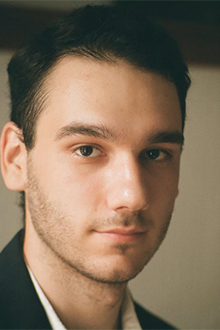
Where do you call home?
I was born and raised in Chicago, but I have spent every single summer since I turned 13 in Quebec. My mom’s side of the family is from here, and I was a long-time camper and counselor at the Camp Musical du Père Lindsay in Lanaudière. So, home for me is a big city on lake Michigan and a small camp au bord du lac Priscault.
What would being named the winner of the Wirth Vocal Prize enable you to do?
Winning the Wirth Prize would give me tremendous flexibility for the next chapter of my singing life. It would allow me to audition for companies and Young Artist Programs in the US and in Europe without the financial stress of booking travel and accommodations. It would also allow me to devote even more of my focus towards maintaining a career as a singer without having to worry about fitting a singer’s schedule into a job that helps to pay the bills.
Learn more
Who are you studying with and who will be your collaborative pianist?
I am currently studying with John Mac Master, and I will be collaborating with Kerry Agnew.
Do you have a favourite part of your program?
I love the excerpt of Robert Schumann’s Dichterliebe. I recently had the chance to perform the entire cycle, and I find it to be such an emotionally moving experience (both to perform and to listen to). The music and poetry bring me to the bounds of human experience without ever going into the super-human. That’s a special quality, for a genre that spends much of its time in super-human realms.
What’s a recent discovery you’ve made?
I think the two most important things for me when singing are focus and gratitude. If I can get those two flowing, then everything will line up.
How has music helped you find connection?
Music has been one of the only ways to connect in person this year. I’m so grateful that we’ve been able to have in-person lessons and coachings since the fall, as it has been one of the only ways to be spend time with others indoors. Since January, we’ve been able to have Song Interpretation class as well as opera rehearsals, and those have been the only ways to be with a group of people indoors for an extended period of time. It has made me quite conscious of the beauty of these moments; it’ll be a long time before I take music making for granted.
When you’re not in preparation and practice mode, how do you disconnect?
I watch and consume way too much sports content (I co-run a twitter account that analyzes NFL Punter performance using our own custom metrics…we’ve been able to interview a couple of NFL players through it). I dive into intricate cooking and baking projects (I had a sourdough starter before it was cool). I garden (when the weather permits). I play Settlers of Catan and other board games.
Biography
Praised for his “contagious sensibility” (Revue l’Opéra), Canadian-American Baritone, Raphaël Laden-Guindon made his professional debut at the 2020 Festival de Musique de Lachine, as a part of the concert entitled “Spotlight on the New Generation.” He most recently appeared as Ophémon in L’amant anonyme (Chevalier de St-Georges) and as Bob in The Old Maid and the Thief (Menotti) as a part of Opera McGill’s 2020-2021 season.
Recent credits include Mr. Olsen in Street Scene (Weil), Publio (cover) in La Clemenza di Tito (Mozart) with Opera McGill; Aristeo in Orfeo (Rossi), Corebo in La Didone (Cavalli) and Aristone in Xerse (Cavalli) with the Yale Baroque Opera Project; as well as the title role in La chute de la maison Usher (Debussy) and Doctor Gregg in Gallantry (Moore) with the Opera Theatre of Yale College (OTYC). He served as the Artistic Director of the OTYC (Yale’s undergraduate run opera company) in the 2018-2019 season and sang with the prestigious Yale Schola Cantorum between 2015 and 2018.
During his time at McGill he was a recipient of both SSHRC and FRQSC master’s research scholarships. He will be graduating from McGill this Spring, in the studio of John Mac Master.

